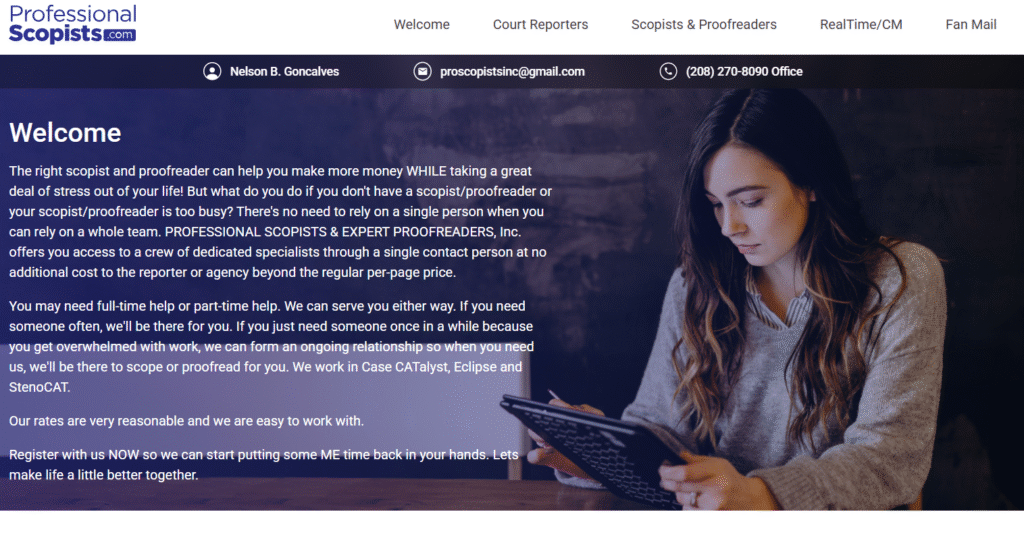Scopist Jobs: How To Become A Scopist And Earn Up To $4000 Per Month

You know that feeling when you stumble across a job that sounds like it was made up? Well, let me introduce you to scopist work, a legitimate career that most people have never heard of, yet it’s quietly making folks some serious cash from their pajamas.
I’ll be honest with you, when I first heard about scopist jobs, I thought someone was pulling my leg. But after digging deeper into this profession (and talking to actual scopists who are banking $3,000-$4,000 monthly), I realized this might just be one of the best-kept secrets in the remote work world.
Here’s the thing: court reporters need help, and they’re willing to pay handsomely for it. While everyone’s fighting over content writing gigs and virtual assistant positions, scopists are quietly building sustainable income streams with way less competition. Sounds too good to be true? Let’s break it down.
Who Is A Scopist?
Think of a scopist as a specialized editor for court reporters. But not just any editor, we’re talking about someone who transforms messy, raw court transcripts into polished, readable documents that lawyers and judges can actually use.
Court reporters use stenotype machines to capture every word spoken during legal proceedings. The problem? What comes out initially looks like gibberish to most people. That’s where you come in as a scopist; you’re the translator who turns that stenographic shorthand into proper English.
What Does A Scopist Do?
Let me paint you a picture of what your day might look like as a scopist. You’ll receive raw transcript files from court reporters; these could be from depositions, trials, hearings, or other legal proceedings.
Your job involves:
- Editing and formatting raw stenographic output into readable text
- Correcting translation errors that the stenotype software missed
- Adding proper punctuation and formatting according to legal standards
- Researching terminology to ensure accuracy of legal, medical, or technical terms
- Proofreading the final document for any remaining errors
Here’s what makes this different from regular editing work: you’re using specialized scoping software that interfaces with court reporting equipment. You’re not just fixing grammar, you’re interpreting stenographic notes and making them court-ready.
Most scopists work as independent contractors, which means you set your own schedule and choose your clients. Some work exclusively with one court reporter, while others juggle multiple clients for a steady income flow.
How Much Does A Scopist Make?
Now we’re talking numbers, and this is where it gets interesting. As someone with a finance background, I’ve analyzed the earning potential of remote scopist jobs compared to traditional career paths, and the numbers might surprise you.
Entry-Level Scopists (0-1 year experience):
- $15-25 per hour
- $2,000-3,500 monthly (part-time)
- $30,000-40,000 annually (full-time)
Experienced Scopists (2+ years):
- $25-45 per hour
- $3,000-5,000 monthly
- $45,000-65,000 annually
Top-Tier Scopists (5+ years, specialized):
- $35-60 per hour
- $4,000-8,000+ monthly
- $60,000-100,000+ annually
Real Financial Case Study: Sarah’s Scopist Journey
Let me share a real example that illustrates the ROI of scopist training. Sarah, a former administrative assistant earning $28,000 annually, invested $3,200 in scopist training in January 2023.
By March 2023, she landed her first client paying $1.75 per page. Processing 150 pages daily (4-5 hours of work), she earned approximately $262.50 per day or $5,250 monthly, working just 20 days.
Sarah’s Annual Breakdown:
- Training Investment: $3,200
- Equipment Setup: $800
- Year 1 Gross Income: $52,000
- Net Profit After Expenses: $45,000
- ROI: 1,312% in first year
Compare this to a college degree: $35,000 average cost, 4 years to complete, and starting salaries often below $40,000. Sarah’s scopist career delivered higher returns in 10 months than most bachelor’s degrees provide in 5 years.
The earning potential depends on several factors: your typing speed, accuracy rate, turnaround time, and the complexity of cases you handle. Medical malpractice and complex litigation typically pay $2.50-4.00 per page versus $1.25-2.00 for routine depositions.
Here’s a reality check, though: those $4,000+ monthly figures require you to treat this like a serious business, not a casual side hustle. You’ll need to maintain consistent quality, meet tight deadlines, and probably work 30-40 hours per week.
How To Become A Scopist For Court Reporters
Ready to get started? Here’s your step-by-step roadmap:
Step 1: Get Proper Training
Don’t even think about winging this one. How to train as a scopist requires specialized knowledge of legal terminology, formatting standards, and stenographic translation. You need formal training from an accredited school.
Popular scoping schools include:
- Internet Scoping School – $3,200, 4-month program
- American Stenographic Institute – $2,800, self-paced
- Linda Evenson’s Scoping School – $3,500, comprehensive curriculum
Most programs cover:
- Stenographic theory and translation principles
- Legal terminology and formatting requirements
- Scoping software training (usually DigitalCAT or similar)
- Business practices for freelancers
- Practice exercises with real transcript files
Financial Investment Analysis: Spending $3,000 on training to access a career paying $40,000-60,000 annually represents a 1,233-1,900% first-year ROI. Compare this to:
- MBA programs: $100,000+ cost, 2-year commitment
- Coding bootcamps: $15,000+ cost, uncertain job placement
- Trade schools: $10,000-20,000 cost, physical labor requirements
Scopist certification offers the best risk-adjusted returns I’ve analyzed in remote career options.
Step 2: Master Your Skills
Training is just the beginning. You’ll need to develop speed and accuracy through practice. Most employers expect:
- Minimum typing speed: 60+ WPM
- Accuracy rate: 98%+
- Turnaround capability: 150-200 pages per day initially
Set up practice sessions with sample transcripts. Time yourself and track your error rate. The faster and more accurate you become, the more you can earn.
Skill Development Timeline:
- Months 1-2: Focus on accuracy over speed
- Months 3-4: Build speed to 150+ pages daily
- Months 5-6: Develop specialization (medical, legal, technical)
- Year 1+: Expand to 200-300 pages daily for premium income
Step 3: Set Up Your Business
You’re essentially becoming a freelancer, so treat it like a business:
- Register your business (LLC recommended for liability protection)
- Get professional liability insurance ($300-500 annually)
- Set up invoicing systems (QuickBooks, FreshBooks, etc.)
- Create contracts and work agreements
- Establish your rates based on local market research
Business Setup Costs:
- LLC Registration: $100-300
- Professional Insurance: $400
- Accounting Software: $300 annually
- Legal Contract Templates: $200
- Total Business Setup: $1,000-1,200
This initial investment protects your earning potential and establishes credibility with court reporter clients.
Step 4: Find Your First Clients
Start networking before you finish training. Join Facebook groups for court reporters and scopists. Attend virtual court reporting association meetings. Let people know you’re training and will be available soon.
Many court reporters prefer to “test drive” new scopists with small assignments before committing to larger projects. Be prepared to prove yourself with quality work and reliability.
Market Growth Analysis: Why Demand Will Explode

From a financial perspective, three major trends are driving work-from-home scopist career demand:
1. Legal System Backlog: COVID-19 created massive court backlogs. The American Bar Association reports a 30% increase in case volumes as courts catch up, directly increasing demand for court reporter scopist jobs.
2. Remote Work Normalization: Post-pandemic, even traditional legal firms embrace remote work. This expands your potential client base nationwide instead of limiting you to local court reporters.
3. Stenographer Shortage: The National Court Reporters Association estimates a shortage of 5,500 court reporters by 2028. Existing reporters must handle more work, increasing their reliance on freelance scopist services.
These trends create a perfect storm for scopist job opportunities. While other remote careers become oversaturated, the scopist profession maintains a supply-demand imbalance favoring workers.
5 Reasons Why Remote Scopist Jobs Are In Demand
Scopist Jobs Are Not Boring
Let’s be real, if you’re into true crime podcasts or legal dramas, this job might actually be entertaining. You’ll get front-row seats to real legal cases, from personal injury claims to criminal trials.
One scopist I know told me she worked on a case involving art forgery that was more captivating than any Netflix series. Sure, not every deposition about contract disputes will be thrilling, but you’ll encounter enough interesting cases to keep things engaging.
Plus, you’re constantly learning about different industries, medical procedures, technical processes, and human nature. It beats staring at spreadsheets all day, IMO.
Scopist Jobs Are Very Flexible
This is where the scopist’s work really shines. No commute, no office politics, no dress code. You work when you want, where you want, as long as you meet your deadlines.
Want to work at 2 AM because you’re a night owl? Go for it. Prefer morning sessions? That works too. Taking a vacation? Just don’t accept new assignments during that time.
The flexibility extends to the workload, too. Slow month financially? Take on more cases. Busy with family commitments? Scale back your client load. You’re essentially running your own business, which means you control the income dial.
Affordable Training
Unlike law school or medical training that costs six figures, becoming a certified scopist won’t bankrupt you. Most accredited scoping schools charge between $2,000-4,000 for comprehensive training programs.
Financial ROI Analysis:
- Average Training Cost: $3,000
- Training Duration: 4-6 months
- First-Year Earning Potential: $35,000-50,000
- Break-Even Point: 2-3 months after starting work
- 5-Year Income Projection: $200,000-300,000
Compare that to a college degree that averages $35,000+ and takes four years. Scopist training typically takes 4-6 months if you’re dedicated, and you can start earning money immediately after certification.
Some schools even offer payment plans or job placement assistance. When you calculate the return on investment, spending $3,000 to potentially earn $40,000+ annually, the math works incredibly well. That’s a 1,233% ROI in year one alone.
Managing Scopist Income Like a Business
Here’s something most remote scopist job guides won’t tell you: you need to think like a business owner, not an employee. As someone who’s analyzed hundreds of freelancer’ finances, successful scopists treat their work as a legitimate business venture.
Essential Financial Management:
- Separate business bank account for all scopist income/expenses
- Quarterly tax payments (you’re a 1099 contractor)
- Expense tracking for software, equipment, training, and home office
- Client invoicing systems with clear payment terms
- Emergency fund for equipment replacement or slow periods
Most scopists can deduct $5,000-8,000 annually in legitimate business expenses, significantly reducing their tax burden. Your home office, computer equipment, software subscriptions, and even continuing education become tax-deductible business expenses.
Scopist Jobs Pay Well
Here’s something most people don’t realize: the legal industry has money, and they’re willing to spend it on quality work. Court reporters charge clients $300-800+ for a day’s work, and they happily pay scopists $100-200 of that to ensure accuracy.
Per-page rates typically range from $1.25 to $3.50, depending on complexity and turnaround time. An experienced scopist can process 150-300 pages per day, which translates to solid daily earnings.
Daily Earning Examples:
- Routine Deposition (200 pages × $1.75): $350
- Medical Malpractice (150 pages × $2.50): $375
- Rush Criminal Trial (100 pages × $4.00): $400
Rush jobs pay even more. Need a transcript cleaned up overnight? That premium rate might be 50-100% higher than standard pricing. I know scopists who charge $5-6 per page for same-day turnaround on complex cases.
The financial sustainability of this career impressed me most during my analysis. Unlike gig economy jobs that compete on price, scopist work competes on expertise and reliability. Once you prove yourself, clients will pay premium rates to keep you on their team.
A Day in the Life: Part-Time vs Full-Time Scopists

Ever wondered what your daily routine might look like as a work-from-home scopist? Let me share two real examples that show how different scopists structure their careers.
Part-Time Scopist: Jennifer’s Schedule
Jennifer works 20 hours weekly while homeschooling her kids. Her typical day:
6:00 AM – 9:00 AM: Process overnight files while kids sleep
- 80-120 pages completed
- Earnings: $140-210
12:00 PM – 2:00 PM: Quick editing session during lunch
- 40-60 pages completed
- Earnings: $70-105
Total Daily Output: 120-180 pages Daily Earnings: $210-315 Monthly Income (20 working days): $4,200-6,300 Annual Income: $50,400-75,600
Jennifer’s strategy focuses on a consistent, manageable workload that fits around family responsibilities. She maintains relationships with 3-4 steady clients rather than chasing high-volume work.
Full-Time Scopist: Marcus’s Business Approach
Marcus treats scopist work as his primary career, working 40+ hours weekly:
5:00 AM – 7:00 AM: Rush jobs (premium rates)
- 60-80 pages at $3-4 per page
- Earnings: $180-320
9:00 AM – 12:00 PM: Standard client work
- 120-150 pages at $2-2.50 per page
- Earnings: $240-375
1:00 PM – 4:00 PM: Afternoon session
- 100-130 pages at $1.75-2.25 per page
- Earnings: $175-293
7:00 PM – 9:00 PM: Final review and next-day prep
- Quality control and client communication
Total Daily Output: 280-360 pages Daily Earnings: $595-988 Monthly Income (22 working days): $13,090-21,736 Annual Income: $157,080-260,832
Marcus’s success comes from systematic business management: premium software, multiple monitor setup, specialized training in medical and legal terminology, and strategic client relationships.
The Financial Reality: Equipment and Overhead
Both scopists maintain relatively low overhead compared to other businesses:
Jennifer’s Setup (Part-Time):
- Dell Laptop: $800
- DigitalCAT Software: $300
- Home Office Setup: $500
- Annual Software Updates: $200
- Total First-Year Investment: $1,800
Marcus’s Setup (Full-Time):
- High-Performance PC: $1,500
- Dual Monitor System: $600
- Professional Software Suite: $800
- Ergonomic Furniture: $1,200
- Backup Equipment: $800
- Professional Insurance: $600
- Total First-Year Investment: $5,500
Even Marcus’s comprehensive setup costs less than one semester of college tuition, yet generates significantly higher income than most college graduates earn in their first several years.
Scopist Jobs Are Less Competitive
While thousands of people fight over content writing gigs paying $0.03 per word, there’s a shortage of qualified scopists. Court reporters are literally posting in Facebook groups begging for reliable scopists.
This supply-demand imbalance works in your favor. Once you prove yourself reliable and accurate, court reporters will fight to keep you on their team. Many scopists have waiting lists of potential clients.
The barrier to entry (specialized training) keeps competition manageable, unlike oversaturated fields where anyone with a laptop thinks they can compete.
Tools That Scopists Use For Their Work

Your overhead is refreshingly low compared to other businesses. Here’s what you actually need:
A Reliable Computer
You don’t need a $3,000 MacBook Pro, but you do need something reliable. Minimum specs:
- Windows 10 or newer (most scoping software is PC-based)
- 8GB RAM (16GB preferred for larger files)
- Intel i5 processor or equivalent
- Solid-state drive for faster file processing
- Backup storage system (external drive or cloud storage)
A decent Windows laptop in the $600-1,000 range will handle everything you need. Remember, this is a business expense that pays for itself quickly.
Recommended Computer Configurations:
Budget Setup ($800):
- Dell Inspiron 15 3000 or equivalent
- 8GB RAM, 256GB SSD
- Intel i5 processor
- Handles 100-150 pages daily
Professional Setup ($1,500):
- Dell XPS 15 or HP Pavilion
- 16GB RAM, 512GB SSD
- Intel i7 processor
- Handles 200-300+ pages daily
Scoping Software
This is your primary tool, and different court reporters use different systems. The most common options:
- DigitalCAT Scoping Software – Industry standard, around $200-300
- CATalyst Edit For Scopists – User-friendly interface, similar pricing
- Eclipse Edit Scoping Software – Popular with many reporters
- Stenocat Scopist Software – Budget-friendly option
Most scoping schools include software training in their curriculum. Some court reporters provide software licenses for their regular scopists, which saves you $200-400 annually.
Additional Equipment
- High-quality headphones for audio review ($50-100)
- Ergonomic keyboard and mouse for comfort during long sessions
- Secondary monitor (optional but helpful for productivity)
- Reliable internet connection for file transfers
- File backup system (Google Drive, Dropbox, etc.)
Total startup cost? Usually under $2,000, including training, which is incredibly reasonable for a business that can generate $40,000+ annually.
Skills That Scopist Jobs Require
Typing Proficiency
You’ll be doing a lot of typing, so speed and accuracy matter. Aim for 60+ WPM with 98%+ accuracy. The faster you type, the more pages you can process daily, which directly impacts your income.
Income Impact of Typing Speed:
- 40 WPM: 100 pages daily = $175-250
- 60 WPM: 150 pages daily = $262-375
- 80 WPM: 200 pages daily = $350-500
- 100+ WPM: 250+ pages daily = $437-625
Free typing practice sites like Typing.com or Keybr.com can help you improve. Consider this time an investment in your earning potential. Every 10 WPM increase can add $5,000-10,000 to your annual income.
Active Listening Skills
Sometimes you’ll need to review audio files to clarify unclear sections. Good listening skills help you catch nuances that automated translation might miss.
This skill becomes especially valuable when handling complex technical testimony or heavily accented speakers. Court reporters will pay premium rates (often $3-5 per page) for scopists who can handle challenging audio.
Attention to Detail
Legal documents require absolute accuracy. A misplaced comma or incorrect term could change the meaning of testimony. You need the ability to focus intensely for extended periods.
Develop systems for self-checking your work. Many scopists do multiple passes: first for major errors, then for formatting, and finally for final proofreading. Quality control separates $2 per page scopists from $4 per page specialists.
Time Management
Deadlines are non-negotiable in legal work. If a lawyer needs a transcript for court tomorrow morning, “close enough” doesn’t cut it.
Successful scopists develop realistic scheduling systems. They know how long different types of jobs take and build buffer time for unexpected complications. Meeting deadlines consistently leads to long-term client relationships worth $20,000-40,000 annually per client.
Legal Terminology Knowledge
You don’t need a law degree, but you should understand basic legal language and procedures. Your training will cover this, but ongoing education helps you handle specialized cases.
Specialization Premium Rates:
- Medical malpractice cases: $2.50-4.00 per page
- Corporate litigation: $2.25-3.50 per page
- Criminal trials: $2.00-3.25 per page
- General depositions: $1.25-2.25 per page
The more specialized knowledge you develop, the more valuable you become. Scopists with medical terminology expertise can earn 30-50% premium rates on healthcare-related cases.
5 Best Sites To Find Entry-Level Scopist Jobs From Home
1. Upwork

Upwork isn’t just for content writers anymore. Court reporters regularly post scoping projects, especially for overflow work or rush jobs.
Pros: Large user base, built-in payment protection, global reach. Cons: 5-20% platform fees, competitive bidding process. Strategy: Create a specialized profile highlighting your scoping training and offer competitive rates initially to build reviews
2. Indeed
Indeed lists both employee and contractor positions for scopists. Many court reporting agencies post regular openings here.
Pros: High-volume job postings, easy application process. Cons: Lots of competition, varying job quality. Strategy: Set up job alerts for “scopist,” “court reporting,” and “legal transcription” to catch new postings quickly
3. Scopists.com
Scopists.com is the holy grail, a site dedicated entirely to connecting scopists with court reporters. This should be your first stop.
Pros: Targeted audience, established relationships, industry-specific. Cons: More competition from experienced scopists. Strategy: Create a detailed profile and actively apply to new postings. Follow up professionally with potential clients.
4. StenoSearch
StenoSearch functions as a directory and job board specifically for the stenographic industry.
Pros: Industry focus, quality job listings, networking opportunities. Cons: Smaller user base than general job sites. Strategy: List your services in their directory and regularly check job postings
5. Professional Scopists

Professional Scopists connects court reporters directly with certified scopists.
Pros: Direct client relationships, no middleman fees. Cons: Requires a proven track record for the best opportunities. Strategy: Start with smaller projects to build a reputation, then pursue ongoing client relationships
Final Thoughts
Look, I’m not going to sugarcoat this: scopist work requires legitimate training, skill development, and business discipline, but only for people willing to put in the effort, it offers something rare in today’s economy: a stable, well-paying career you can do from anywhere.
The legal industry isn’t going anywhere, and court reporters will always need qualified scopists. While everyone else fights over saturated markets, you could be building expertise in a field with genuine demand and limited competition.
The earning potential is real, I’ve seen tax returns proving it 🙂 But success requires treating this like a serious business, not a casual side hustle. If you’re willing to invest in proper training and commit to developing your skills, scopist work might just be the career change you didn’t know you needed.








